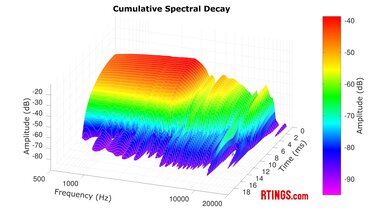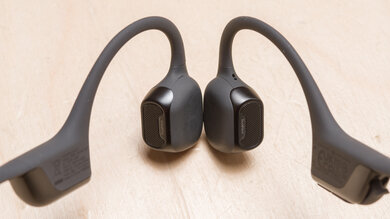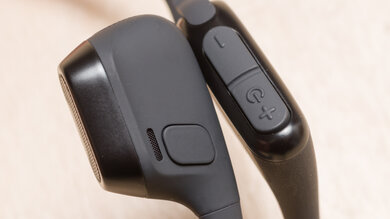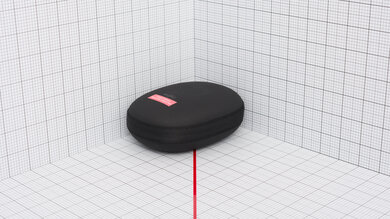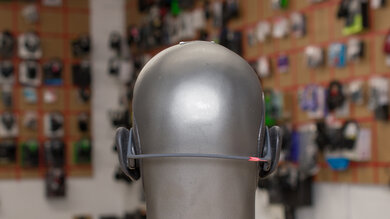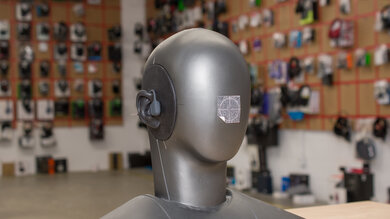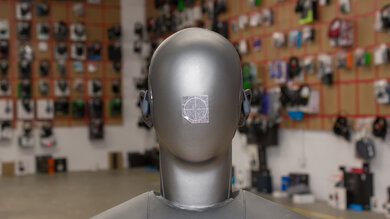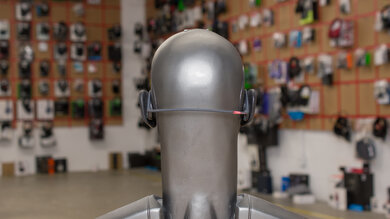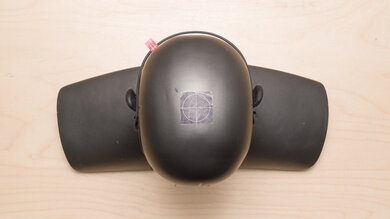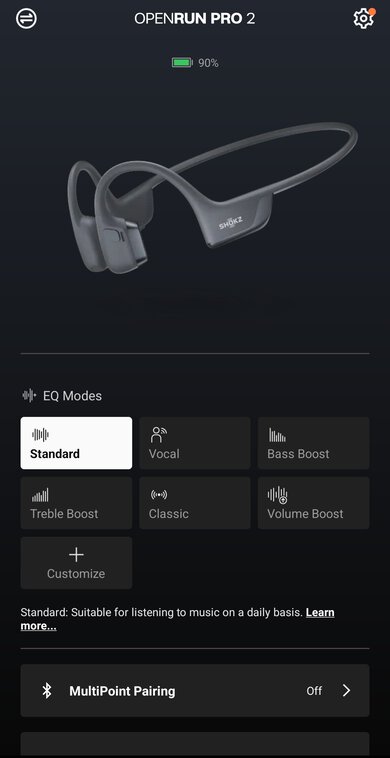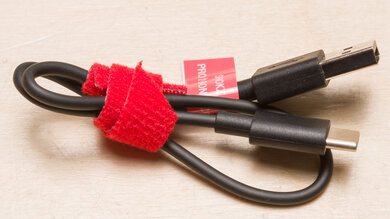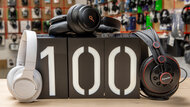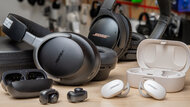The Shokz OpenRun Pro 2 Bone Conduction is the 2024 follow-up to the Shokz OpenRun Pro Bone Conduction released in 2022. In essence, while this next generation of Shokz looks rather like the previous version, it seems that this time, it's what's on the inside that accounts for the biggest change. New to the second generation is a modified bone conduction and dynamic driver configuration, as opposed to just bone conduction alone, resulting in reduced vibrations. The open-fit design prioritizes environmental awareness and athleticism above all else, so whether running or walking your dog outdoors, you can hear any dangers and stay safe while still hearing your tunes.
Our Verdict
The Shokz OpenRun Pro 2 is good for sports and fitness. The open-fit design allows you to monitor your surroundings, which is especially helpful for avoiding hazards when exercising outdoors. It's comfortable and very stable, making it a solid companion for jogs, though if you do any horizontal exercises like crunches, the headband can get in the way. In addition to being dust and water-resistant, the well-built IP55-rated headset is also sweatproof, according to the manufacturer, as the metal frame is mostly covered in silicone. Plus, the tactile controls mean that even if your hands are sweaty, skipping a song or cranking the volume isn't too fiddly. Its case is tough enough to withstand a few bumps from your sneakers in a gym bag, and it's light, though the package is still larger than true wireless earbuds. On the other hand, if you want silence to focus at the gym, this isn't the headset for you. If you're used to matching your stride to the beat of your favorite EDM track, the headset lacks low-end oomph, and the treble is quite veiled, too, but if you mainly listen to podcasts or awareness is your concern, you probably won't mind as much.
Continuous battery life will last through most sessions.
Stable fit.
Well-built with IP55 rating.
Leaks audio at elevated output levels.
The Shokz OpenRun Pro 2 is poor for traveling. The open-fit design offers virtually zero noise isolation, so you'll hear bus rumbles, passenger chatter, and airplane cabin ambient din unimpeded. While this may provide you with greater awareness regarding announcements, it otherwise means your audio is more difficult to hear without cranking the volume. It's a comfortable headset to wear when upright, but the wraparound design can get in the way if you lean back to rest your head, too. Still, the battery life is enough to last most flights, and the case helps protect the headset from getting battered around in your bag, even though it takes up real estate in your bag.
Continuous battery life will last through most sessions.
Open-fit lacks versatility for situations where noise isolation is preferred.
Frequency response lacks bass and treble.
The Shokz OpenRun Pro 2 is poor for office use. Unless you want to hear your colleagues because you're collaborating, the open-fit design doesn't block out any environmental noises, which can be distracting and hinder how well you can hear your audio. Plus, sound can escape and be audible to your coworkers, depending on your listening volume and their proximity. The headset is also not well-suited to listening for accuracy, given the under-emphasis in the bass and treble ranges, though it's fine for listening to speech, say during a call or a podcast. On the upside, it's comfortable, the battery life can easily make it through a workday, and the multi-device pairing lets you switch between your work PC and your smartphone.
Bluetooth multi-pair with two devices.
The mic handles background noise well.
Open-fit lacks versatility for situations where noise isolation is preferred.
Frequency response lacks bass and treble.
Leaks audio at elevated output levels.
The Shokz OpenRun Pro 2 only connects via Bluetooth, so you can't connect to consoles. It exhibits high latency without a gaming or low-latency mode, so you may experience an A/V mismatch, which is distracting. The open-fit headset lacks noise isolation and low-end response, making the experience less immersive.
The Shokz OpenRun Pro 2 is a Bluetooth-only headset and can't be used for wired gaming.
The Shokz OpenRun Pro 2 is a poor choice for audio reproduction accuracy, though this is mostly by design. Their open driver design suits folks who want to stay aware of their surroundings, without having their audio take center stage. The combination of bone conduction and dynamic drivers means we struggled to accurately measure their performance in many of the tests that comprise this usage. They're a good fit if you listen to content with a lot of mid-range frequencies, like podcasts, and they comply well with our target in this frequency range. That said, they struggle to produce bass and treble frequencies, muting the thud of kick drums and dulling sibilant cymbal hits.
The Shokz OpenRun Pro 2 has terrible noise isolation, but this is by design. They leave your ear canal open, so all external noises are clearly audible. However, this can also be an advantage if you're a runner who wants to stay aware of your surroundings or work in a collaborative environment.
The Shokz OpenRun Pro 2 has decent microphone performance. The integrated mic does a great job of filtering out unwanted background noise, using an AI algorithm to separate your voice from the noise around you. However, it doesn't always render your voice totally natural, and depending on your timbre, it can cause your voice to sound congested or nasal.
The Shokz OpenRun Pro 2 uses a combination of dynamic drivers and bone conduction technology within an open ear design. This combination means it struggles to output bass and treble frequencies, skewing our consistency results. Furthermore, depending on the shape of your head and ears, the drivers can rest on different parts of the ear, resulting in some variation in audio delivery. The mid-range, which this headset produces ample amounts of, is very consistent between different re-sits and head types, though. So, in practice, if you take the time to adjust the fit, you'll be rewarded with consistent audio delivery.
Performance Usages
Changelog
- Updated May 16, 2025:
This review has been updated to Test Bench 2.0, which adds the following tests: Stereo Mismatch, Group Delay, Cumulative Spectral Decay, PRTF, and Electrical Aspects. We've added new performance usages and updated the text throughout the Sound tests.
- Updated May 14, 2025: We've converted this review to Test Bench 2.0, which updates our sound tests and adds performance usages. You can read more about this in our changelog.
- Updated Mar 26, 2025: Review published.
- Updated Mar 18, 2025: Early access published.
Check Price
Differences Between Sizes And Variants
The Shokz OpenRun Pro 2 come in two sizes—Standard and Mini—and a few colorways; ours is Standard sized and 'Black' (you can see its label). There are also 'Silver' and 'Orange' variants. Shokz produces endorsement versions like the 'Kipchoge Co-branded Edition' colorway, which is named after one of the world's fastest long-distance runners, Eliud Kipchoge, and a 'Boston Marathon Co-branded Edition.’ Besides the sizing difference between the Standard and Mini, we expect these to all perform similarly to our unit.
If you encounter another variant of this headset, please let us know in the comments, and we'll update our review.
Popular Headphones Comparisons
One of the central differences between the Shokz OpenRun Pro 2 and the previous Shokz OpenRun Pro Bone Conduction is the addition of a dynamic driver; it works in concert with the bone conduction tech found in the last generation to reduce the vibrating sensations associated with bone conduction headsets. The OpenRun Pro 2 also swaps out the brand's proprietary charging connection for a more universal USB-C port. Shokz isn't the sole option for bone conduction, and the IP68-rated Mojawa Run Plus is considerably more waterproof. Still, we're in an era with an embarrassment of riches for wireless audio without isolation. Unique options like the Bose Ultra Open Earbuds are very stable 'cuffs’ that clip onto your earlobes for audio on the run, though the OpenRun Pro 2 are possibly slightly more resilient to drops, owing to the internal metal frame and silicone exterior. For the value-driven athlete, the Anker Soundcore C30i are another 'cuff' style pair of earbuds that are more portable than the Shokz, but the mic performance is worse.
If you want a more versatile option that can accompany you to the gym or the office, consider noise isolating earbuds with transparency modes, some of which are our picks for the best wireless earbuds for running. If you prefer the security of a wraparound design, try best neckband headphones. Lastly, if bone conduction isn't your preference, check out the best over-ear headphones for working out.
The main reason to choose the Shokz OpenRun Pro 2 Bone Conduction over the Shokz OpenRun Pro Bone Conduction is for quality of life improvements like the USB-C charging port and the reduced vibrations associated with the first generation OpenRun Pro. While neither offers amazing sound quality, you may prefer the OpenRun Pro 2's extra EQ options. Both have the same IP55 rating with similar builds. If you own the OpenRun Pro already, there aren't many other reasons to get the OpenRun Pro 2 except for a slightly longer battery life.
Choosing between the Shokz OpenRun Pro 2 Bone Conduction and the Shokz OpenFit True Wireless comes down to what you're using them for because they have different strengths. The OpenRun Pro 2 boasts a longer continuous battery life, Bluetooth multi-pair, and the fit is a little more stable. On the other hand, if you find that the wraparound design isn't for you, the OpenFit's flexible over-ear hook design and more portable size may suit you better. Plus, the extra recharges stored in the case are appealing. Still, if you don't want to run with a charging case in your pocket, the OpenRun Pro 2 might be a better pick.
Depending on your needs, you may prefer the Shokz OpenRun Pro 2 Bone Conduction or the Shokz OpenRun Bone Conduction. The OpenRun Pro 2 has improvements like fewer vibrations from the bone conduction drivers and a USB-C charging port instead of the proprietary battery charger with the OpenRun. The OpenRun Pro 2's app lets you change the EQ, and its mic performance is improved. Folks can get it in a smaller size if needed, which makes a difference in sound and comfort. However, the standard OpenRun has a higher IP67 rating, which might override other considerations for the truly outdoorsy.
The Bose Ultra Open Earbuds are slightly better for most people than the Shokz OpenRun Pro 2 Bone Conduction, but each have loyal fans. The Bose are more portable and don't apply pressure near your cheekbones and temples, which can bother some people. Their continuous battery life is comparable to the Shokz, but the extra recharges the case provide edge them ahead. They're also slightly more stable. On the other hand, the Shokz headset has a tougher IP55 rating and multi-device pairing, and it won't get in the way if you have a lot of piercings along your ear lobes. While the Bose are well-built, the silicone and nickel-titanium frame of the Shokz seems more impervious to damage.
Test Results

The Shokz OpenRun Pro 2 use a combination of bone conduction and dynamic drivers to playback your audio. While our testing rig isn't built to measure bone conduction, it can still capture an impression of the frequency response, and we feel that the raw graph, in particular, lends a reasonable representation of how the headset sounds. That said, unlike the vast majority of other headphones we've reviewed, these results aren't as definitive as measurements of in-ears and over-ears that are fully compatible with our Brüel & Kjær HATS Type 5128-B.
As with most open-fits, the frequency response won't match conventional over-ears or in-ears when it comes to reproducing a full sound because it's an inherent limitation of the design as a trade-off for environmental awareness.
Set to its default EQ, this tuning is very mid-range focused and somewhat harsh, which makes it a good choice for podcasts and audiobooks. While you'll still register the weak boom of a kick drum, it lacks depth and body, and the sparkle is missing from the top end. Importantly, how it sounds ultimately depends on how loud noises in your environment are because ambient sounds will mask different frequencies.
You can also choose from several EQ modes within the app to tailor the sound.
The Shokz OpenRun Pro 2 has disappointing frequency response consistency. The chart can look a bit worse than the reality of actually wearing the headset because it scarcely reproduces much bass or high frequencies above the low-treble region, where the majority of the variation is in the measurements.
In real-world use, the mids sound virtually the same between wears, though you'll still want to pay attention to placement, as their design leaves more room for error than in-ears, for example. Glasses can also pose an issue if they have thick arms. Also, on different people, the headset can sit in slightly different locations, which drastically alters your perception of output volume. It’s available in two sizes to reduce fit issues.
As expected for this type of open-fit headset, the bass range rolls off severely. Bass guitar and kick drums in tracks like Cousin Dupree by Steely Dan lack depth and punch. You can still make out the bass punctuating the beat of the track, but it sounds quite weak.
The Shokz OpenRun Pro 2 has a very clear mid-range. Speech comes through well, and lead instruments like saxophones and guitars are played back reasonably evenly. Although the mids adhere well to our target curve, leads sound harsh due to the boost in the mid and high-mids without enough bass to balance out the emphasis. A roll-off in the low-mids can somewhat rob bass guitars of their upper harmonics, which sound a bit hollow.
The Shokz OpenRun Pro 2 doesn't output a bright or detailed treble response. Although it scores a zero in this test as the response is well below our target, the result is due to our rig's limited compatibility with bone conduction technology. That said, subjectively, it's still not a trebly headset. In use, we found that bright harmonics that contribute to detailed and clear vocals and cymbals are markedly diminished but not completely absent.
The headset's peaks and dips performance is middling. This is due to the frequency response having severe roll-offs in both the bass and treble regions as a limitation of the open-fit design, leading to a dramatic-looking graph. Since the headset mainly reproduces mids, it controls its own sound profile well, given how flat that range is. The mid-range sounds harsh due to the absence of much treble, despite the peak in the high-treble, which isn't noticeable for most people. Still, keep in mind that our testing rig has some limitations regarding compatibility with the headset's hybrid bone conduction drivers, so your experience may differ.
This bone conduction headset has poor stereo mismatch performance. As with other tests, though, the performance is impacted by our testing rig's inability to properly measure bone conduction technology. There's some frequency and amplitude mismatch between the L/R drivers, though this can also be attributed to the inconsistencies in treble delivery and overall lack of treble presence. More notably, however, there's a phase shift that occurs in the treble range. This is a real electrical phase shift that's also reflected in our group delay and frequency response results. We don't think this will be perceptible in everyday use for a few reasons. The headset already has a very loose bass, with an open-driver design that doesn't block the ear canal. The driver is also located far away from the ear canal, compared to most traditional, solely dynamic driver designs.
As with other Shokz headsets, our testing rig struggled to measure the group delay performance due to their combination of dynamic and bone conduction drivers. While it scores terribly in our results, it's worth noting that you likely won't notice group delay issues in real-life content. This headset struggles to produce low-end content anyway, with a very loose bass that makes our measurements look worse. It also uses an open driver design that doesn't block the ear canal.
The Shokz OpenRun Pro 2 has an open sound like the Shokz OpenRun Bone Conduction, though it's difficult to capture other measurements due to the drivers sitting in front of your ears towards your cheekbones. In any case, the pinna-related transfer function (PRTF) results are one factor associated with the perception of spatial qualities. In this case, some frequencies sounding more like they're coming inside of your head, while other frequencies may seem as if they're playing from speakers around you.
As the Shokz OpenRun 2 is incapable of reaching 94dB/SPL and its open driver design introduces a lot of room noise, we've decided to mark this test as N/A. Much of the elevated harmonic distortion data is skewed by its inability to produce the frequency response in the bass and treble range, too. That said, you can still see the harmonic distortion results that our measuring rig was able to capture.
These are the settings used to test this headset. Our results are only valid when using it in this configuration.
The Shokz OpenRun Pro 2 carries on the same flexible silicone wraparound shape as the brand's previous headsets but with a combination of bone conduction and dynamic drivers on the inside. Rather than fitting in-ears like a conventional set of neckband earbuds, like the Beats Flex Wireless, the Shokz drivers rest in front of your ears. It comes in two sizes: Standard, which is meant for most people, and Mini, to accommodate youth and folks with smaller heads.
Our Standard-sized 'Black' model looks more like a matte charcoal with darker, black, glossy plastic accents and contrasting white logos on the sides. Other colorways include monochromatic 'Silver' and 'Orange' models. The brand also has endorsement variants like the 'Kipchoge Co-branded Edition’ named after the marathoner Eliud Kipchoge, which comes in white with a gradient of orange accents, and a 'Boston Marathon Co-branded Edition' that adds a unicorn logo on one side with a white frame and accents in a yellow-to-blue gradient.
The headset is very comfortable. It's lightweight, and because one of the properties of silicone is that it adjusts to your body temperature, you won't notice an overheated or cold headset resting on you. Because the headset leaves your ears open, there's no risk of a plugged-in-ear sensation either. Since the headset stays put by going over your ears and placing pressure in front of your ears, this could become uncomfortable, but it also depends on how much the headset stretches to fit you. Similarly, it could fit too loosely, in which case, the Mini size may suit you best.
Unlike the previous Shokz OpenRun Pro, this headset doesn't vibrate as much due to the bone conduction tech, which can bother people who are sensitive to the ‘tickling’ sensation over a prolonged period. It's worth considering whether the headband will get in the way of hats, helmets, hoods, or exercises that require laying on your back, like bench presses, and this depends on how you plan to use the headset.
The Shokz OpenRun Pro 2 has a decent control scheme with three responsive buttons. A multi-function button conveniently resides on the left side at the front of the headset, and it's slightly reshaped compared to the previous generation. Through a series of presses, this button handles the majority of audio playback, phone calls, and the Shokz voice assistant Audrey. You can see the various functions the multi-function button handles, and the main issue is that while some features are intuitive, others require memorization.
The volume buttons on the right side are found just behind your ear, and they feel different from each other, so you won’t confuse them unless you wear gloves. These volume controls also manage powering on/off and battery level announcements. The headset emits distinctive chimes for volume changes and when you’ve maxed out or minimized the volume. A voice prompt clearly announces pairing, connection status, and battery level information.
The Shokz OpenRun Pro 2 is a fairly portable headset. Its lightweight design makes it easy to carry or wear around your neck when not in use. Plus, each end of the headset is magnetic and can snap together, so if your neck is smaller, it'll be extra secure. It's convenient since it's self-contained without fiddly accessories to lose track of. But it still takes up more room than most true wireless earbuds, and you can't comfortably fit it in your jeans' pocket.
The case is excellent. It zips up to completely enclose the headset, protecting it from bumps and whatever else is floating around in your duffle bag without adding much extra weight. It also has a fabric loop if you choose to hang it from a clip or a hook. The interior snugly fits the headset, and there's a pocket with a flap for the charging cable.
The Shokz OpenRun Pro 2 is very well built. It’s IP55-rated against dust and water exposure; the manufacturer also claims the headset is sweat-resistant. Still, it's not as dust and water-tight as the IP67-rated Shokz OpenRun Bone Conduction model.
High-quality silicone covers most of the nickel-titanium alloy internal frame. Plus, the USB-C charging port has a cover to keep out particles and moisture. Good quality plastic covers the drivers and the battery compartment. The headset seems able to withstand a couple of accidental drops, but the flexible metal frame might be a weak point if it receives excessive stress or abuse. It doesn't have a specific impact rating, though.
The Shokz OpenRun Pro 2 is amazingly stable. Intense shakes, nods, and tilts won't cause the headset to fly off of you, though it can shift and require repositioning if you're rigorous. It easily stays on during repetitive movements like jogging. If you perform more jarring exercises like box jumps, the headset can move more, but it won't come off. It's also possible that the frame can get in the way of hats or helmets and jostle into them, but it's unlikely these will dislodge the headset.
Because the headset band doesn't resize, it applies a slightly different amount of pressure to different-sized heads, but we found that the Standard size stayed put on average and larger heads. However, on people with smaller heads, the back droops, tilting the driver's location upwards, and this affects the sound, even if the headset stays on. If the back of the headset droops because it's too large, there's also the Mini size for folks with smaller heads and youths.
As expected, the Shokz OpenRun Pro 2 has terrible full range noise isolation. Open-fit designs such as this one leave your ear canals open to hear your surroundings for maximum situational awareness, which is great for running outdoors or working in collaborative office spaces. This absence of noise isolation isn’t ideal for commuting, though, as it blocks nothing out, leaving your audio content to compete with background sounds.
In common scenarios, the open-fit headset doesn’t isolate you from your environment (which is expected), so you can easily monitor your surroundings. That said, it works better for some uses than others. If you go for late night walks, this design allows you to stay aware, but if you also want to focus in silence at the gym, the open-fit lacks that versatility.
The Shokz OpenRun Pro 2 has mediocre leakage performance. Depending on the volume level, a bright and mid-rangey representation of your audio may be audible in shared spaces. If you’re running past somebody, though, they would need to be quite close to catch much of anything at all.
The Shokz OpenRun Pro 2's microphone system's recording quality is not bad. Voices sound intelligible with enough lower mids to sound full. Depending on the pitch of your voice, though, the uneven frequency response of the mic can cause a congested tone or introduce a very slight lisp. Because the headset uses an AI noise reduction algorithm (which is always enabled), you can hear the tone change throughout the demo recording as the algorithm attempts to correct noise that isn't present.
The microphone’s noise handling is great. The AI noise reduction algorithm effectively separates your voice from background sounds. Besides overpoweringly loud noises like trains, which can creep in somewhat, the headset mic system cuts out other people’s voices rather well and prioritizes your speech.
The Shokz OpenRun Pro 2 has an alright battery life. It's advertised to reach 12 hours of audio playback time on a single charge. We measured nine hours of battery life, but we expect that in everyday life, you'll get a longer battery life than this. Because we standardized loudness levels based on the microphones in our testing rig, we had to increase the headset to max out the volume to reach 85 dB/SPL. With that said, the microphones used to measure the output level are only in the ear canals of the test rig; max volume is experienced as louder than 85 dB/SPL when you wear the headset.
Unlike the previous Shokz headsets, this one scraps the proprietary charger for a standard USB-C connection, which is a universal choice; you don't need to be as vigilant about where you store the cable. The headset also quickly charges in five minutes for an extra 2.5 hours of battery life, according to the manufacturer, and when left idle, it'll enter a standby mode to conserve battery life.
The Shokz app is good; check out the video tour. It covers the majority of your needs on the home screen, including EQ presets and a five-band equalizer with which you can save your own custom settings. There's also a 'Classic' EQ preset, which is a bone conduction-only mode that disables the dynamic drivers, so the headset vibrates more like previous Shokz models during audio playback.
With the app, you can control multi-device pairing, change the language and the volume of voice prompts, control playback in other apps, and update the firmware. Otherwise, it's fairly simple because you can't remap controls, change Bluetooth codecs, or access spatial audio.
It includes a 28 cm (11-inch) USB-A to USB-C cable to charge the Bluetooth-only headset with no wired connectivity. This USB-C compatibility seems like a convenient update to the Shokz OpenRun Pro2 compared to previous models like the Shokz OpenRun Pro Bone Conduction, which use proprietary charging cables instead.
The Shokz OpenRun Pro 2 demonstrates very good Bluetooth connectivity. It's capable of multi-pairing with up to two devices, meaning you can easily switch between your laptop and smartphone, which is nice considering there's no quick pair feature. The headset supports a greater connection range than the Shokz OpenRun Bone Conduction, making it possible to leave your phone in your gym locker, assuming it's not that far from the workout area. While latency varies with different devices and some apps can compensate, you may notice A/V sync issues because the headset's latency measured is high enough that videos can exhibit lipsync mismatch. Unfortunately, the app lacks a low-latency mode too.
You can only connect the headset to your PC via Bluetooth. Once wirelessly connected, you get full audio and microphone support.

